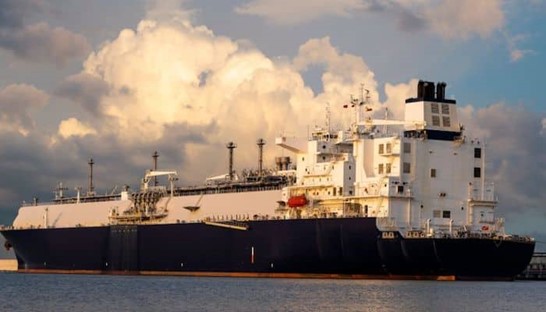In our gut we “know” that technology will not solve global warming – let alone all the other factors that degrade our biosphere.
Yes, technology is absolutely required to curb GHG emissions. But it must be technology in support of humanitarian, ecological goals. And the application of technology must be supported by end-to-end analysis.
The fossil fuel industry tells us great stories about transition fuels, carbon offsets, green hydrogen, carbon capture and storage, geoengineering and so forth. But they are harmful stories, little more than delaying tactics. Even in the short term they do more harm than good. They delay the inevitable, hard decisions we need to make.
These two articles put some facts around things we already knew in our gut:
Exported gas produces far worse emissions than coal, major study finds

Photo from https://www.marineinsight.com/types-of-ships/biggest-lng-ships/
“Research challenges idea that sending liquefied natural gas around the world is cleaner alternative to burning coal.
“The idea that coal is worse for the climate is mistaken – LNG has a larger greenhouse gas footprint than any other fuel,” said Robert Howarth, an environmental scientist at Cornell University and author of the new paper. “To think we should be shipping around this gas as a climate solution is just plain wrong. It’s greenwashing from oil and gas companies that has severely underestimated the emissions from this type of energy.”
Drilling, moving, cooling and shipping gas from one country to another uses so much energy that the actual final burning of gas in people’s homes and businesses only accounts for about a third of the total emissions from this process, the research finds.
“The peer-reviewed research…challenges the rationale for a huge surge in LNG facilities along the US Gulf coast, in order to send gas in huge tankers to overseas markets. The US is the world’s leading LNG exporter, followed by Australia and Qatar.
Previous government and industry estimates have assumed that LNG is considerably lower emitting than coal, offering the promise that it could replace it in countries such as China, as well as aiding European allies menaced by the invasion of Ukraine by Russia, a major gas producer.
But … LNG expansion is not compatible with the world avoiding dangerous global heating, with researchers finding in recent years the leakage of methane, a primary component of gas and a potent planet-heating agent, from drilling operations is far higher than official estimates. …[in addition] as much as 3.5% of the gas delivered to customers leaks to the atmosphere unburned, much more than previously assumed. Methane is about 80 times more powerful as a greenhouse gas than carbon dioxide, even though it persists for less time in the atmosphere.”
[The quotations above are from a Guardian article and from the research paper on which it was based].
Ex-carbon offsetting CEO charged with multimillion-dollar fraud
“… former CEO of C-Quest Capital, indicted over allegations of carbon credit manipulation… stepped down as CEO of C-Quest in February this year. In June, the new management of C-Quest announced that they had reported their former CEO to US authorities for his role in allegedly faking emissions data to generate millions of worthless carbon credits…[in a] scheme that manipulated information on the impact of cooking stove projects in Africa and south-east Asia to make them appear far more successful at reducing emissions than they were in reality…to fraudulently obtain carbon credits by using manipulated and misleading data. They then sold those credits to unsuspecting buyers in the multi-billion-dollar global market for carbon credits.”
[Hopefully this story is an outlier in the business of carbon credits. Again*, we have a gut feel about offsets; maybe it is a financial technology necessary through the transition. But in my view, it is a delaying tactic. Offsets will not solve the degradation of the biosphere. In this particular instance the offsets are not just worthless, they actively, deliberately, help to degrade the biosphere.
The quotations above are from a Guardian article.
*Again? See my 2021 post on wood pellets. That entry is about the “carbon neutrality” of wood pellets. It is essentially an offset story with a slightly different title. It is accounting technology to support a GHG emitting industry.]
What’s the point of quoting these articles? How do they relate to E and F? How would the creation of a Federation of Environmental Organizations make any difference?
It’s about stories. E creates cover stories to have us believe that technology (engineering or financial) is the answer. We are told not to worry. We are told to keep spending; our lifestyle mustn’t change. Otherwise growth would stall, recession reign and chaos descend. F needs to create equally powerful stories, based on end-to-end research, based on facts. Stories that point to a bright future, but also clarify that some more fundamental changes will be necessary.
What are “E” and “F”? – Please look at the HOME page.
